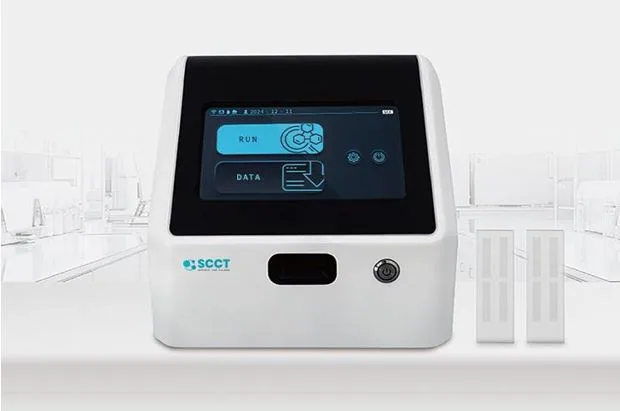Somatic Cell Count Test Kit: Ensuring Milk Quality and Herd Health
In the dairy industry, ensuring the highest quality of milk is essential for both consumer safety and regulatory compliance. One of the most important indicators of milk quality is somatic cell count (SCC), which is used to measure the number of somatic cells, primarily white blood cells, in milk. A somatic cell count test kit is a vital tool for dairy farmers, milk processors, and veterinarians to monitor the health of dairy cows and the quality of the milk they produce. This article will explore the importance of somatic cell count, how test kits work, their applications, and the benefits of using them for better milk production and herd health management.
What is Somatic Cell Count (SCC)?
Somatic cells in milk include a variety of cells, but primarily white blood cells (leukocytes). These cells increase in number when the cow’s body responds to infection or inflammation in the udder, commonly caused by mastitis. A high somatic cell count is a strong indicator that the cow may have an infection or that the milk could be contaminated.
Somatic Cell Count (SCC) is measured per milliliter of milk, and it provides a clear picture of milk quality. High SCC levels are usually associated with reduced milk quality, and when milk is found to have high SCC, it can be rejected by processors or sold at a lower price. Regular monitoring of SCC levels is essential for managing herd health and ensuring optimal milk production.
What is a Somatic Cell Count Test Kit?
A somatic cell count test kit is a diagnostic tool used to measure the number of somatic cells in a sample of milk. These test kits are designed to help farmers and dairy producers quickly assess milk quality and identify potential health issues in the herd. Using an SCC test kit, farmers can detect infections such as mastitis early and take action before the problem worsens.
There are various types of somatic cell count test kits available in the market, ranging from manual test kits to digital and automated devices. These kits allow for quick, on-site testing, making them a convenient option for daily milk quality monitoring.
How Does a Somatic Cell Count Test Kit Work?
Most somatic cell count test kits operate on one of several principles: colorimetric methods, enzymatic reactions, or electronic/optical detection. Here’s an overview of how they work:
- Colorimetric Method:
Many test kits use a color change reaction to indicate SCC levels. The milk sample is mixed with a reagent that reacts with the somatic cells. If the somatic cell count is high, the color of the mixture will change, and the intensity of the color is proportional to the SCC level. The kit may include a color chart to compare the sample’s color with SCC levels. - Enzymatic Method:
Some test kits use enzymatic reactions to measure SCC. The test involves adding a reagent to the milk sample, which interacts with the somatic cells and produces a measurable result. This method provides quick, reliable results and is commonly used in handheld devices. - Electronic or Optical Method:
Modern, digital somatic cell count test kits often use optical or electronic sensors to measure the SCC levels. These sensors may detect light scattering or electrical conductivity changes caused by the presence of somatic cells. The results are displayed on a digital screen, providing a precise and easy-to-read output. - Milk Strip Test:
Some of the most affordable and simple somatic cell count test kits are milk strip tests. A strip is dipped into the milk, and depending on the SCC level, the strip changes color. Farmers can then match the strip color to a reference chart to determine the SCC level.
Advantages of Using a Somatic Cell Count Test Kit
- Early Detection of Mastitis:
The most significant benefit of using a somatic cell count test kit is the ability to detect mastitis early. Mastitis is a common infection in dairy cows that leads to elevated SCC levels. Early detection allows for prompt treatment and reduces the risk of more severe infections that could lead to long-term damage or even the culling of cows. - Improved Milk Quality:
Regular monitoring of SCC helps ensure that milk of high quality is produced. Milk with high SCC is often rejected by processors or sold at a lower price. By using a test kit, farmers can identify and address problems before they affect the milk quality, ensuring that only the best milk is sent to market. - Cost Savings:
Regular use of a somatic cell count test kit allows farmers to take preventative measures early, reducing the need for expensive treatments, antibiotics, or lost milk production. By catching problems early, farmers can save on veterinary bills and prevent larger herd health issues. - Better Herd Health Management:
With frequent monitoring of SCC, farmers can track the health of their herd over time. Elevated SCC in an individual cow or the entire herd can serve as a warning sign of an infection or an environmental issue. This enables proactive management of herd health. - Regulatory Compliance:
Many regulatory bodies, such as the FDA and EU, have established limits for SCC levels in milk. By using a somatic cell count test kit, dairy farmers can ensure that their milk complies with these standards, avoiding fines or penalties and maintaining a good reputation in the market.
Applications of Somatic Cell Count Test Kits
- On-Farm Testing:
Somatic cell count test kits are most commonly used on dairy farms for regular testing of individual milk samples. Farmers use these kits to quickly check the SCC of their herd and identify any cows with elevated SCC, often signaling mastitis or other udder infections. Early detection allows for the prompt treatment of affected cows, improving milk quality and herd health. - Milk Processors:
Milk processors often use SCC test kits to assess the quality of the milk they receive. The SCC level helps processors determine the milk’s suitability for various dairy products, ensuring the production of high-quality, safe dairy products. - Veterinary Practices:
Veterinarians use SCC test kits to monitor herd health. Elevated SCC levels in a specific cow or across the herd can indicate the need for further testing and treatment, such as antibiotics or milking adjustments, helping to ensure that mastitis or other infections are managed effectively. - Quality Control:
Dairy producers use SCC test kits as part of their quality control systems to ensure milk meets industry standards for cleanliness and health. Maintaining low SCC levels is key to producing high-quality milk and meeting consumer expectations.
Types of Somatic Cell Count Test Kits
- Manual Test Kits:
These kits require manual processing, such as mixing reagents and visually comparing color changes. They are typically less expensive but may not be as precise as digital test kits. Manual kits are best suited for small farms or occasional testing. - Digital or Electronic Test Kits:
These kits provide accurate, fast, and precise results. They often display SCC levels on a digital screen, and some models can store results and track trends over time. Digital test kits are ideal for larger farms or those needing frequent and precise testing. - Portable Test Kits:
These portable kits are ideal for farmers who need to test milk on-site. Compact and easy to use, portable test kits offer quick results and are perfect for regular milk quality checks in the field. - Bulk Test Kits:
Bulk test kits are designed for milk processors or larger dairy operations. They can test large volumes of milk and provide quick results, helping businesses maintain consistent quality control across large batches of milk.
FAQs About Somatic Cell Count Test Kits
1. How often should I test my milk for somatic cell count?
It is recommended to test milk at least once a week, or more frequently if any cows show signs of mastitis or other udder problems. Frequent testing helps ensure early detection of issues and better milk quality.
2. What is the ideal somatic cell count for milk?
An ideal SCC for milk is less than 200,000 cells per milliliter. Milk with a higher SCC is considered to be of lower quality and may indicate the presence of mastitis or infection.
3. Can I use a somatic cell count test kit to diagnose mastitis?
Yes, a high SCC is often the first sign of mastitis. While the test kit alone cannot provide a definitive diagnosis, it serves as an early indicator of potential infection, prompting further veterinary investigation and treatment.
4. How accurate are somatic cell count test kits?
When used correctly, somatic cell count test kits are highly accurate. Digital and electronic kits are particularly precise and reliable, while manual kits may have some variability depending on the operator’s experience.
5. Can I use a somatic cell count test kit for bulk milk testing?
Yes, some somatic cell count test kits are designed for bulk testing and can handle larger quantities of milk. These are commonly used by milk processors or larger dairy operations that need to monitor the quality of milk from multiple cows or large batches.
Conclusion
A somatic cell count test kit is an essential tool for maintaining milk quality, preventing mastitis, and ensuring herd health. By regularly monitoring SCC levels, dairy farmers can detect problems early, take corrective action, and ultimately produce high-quality milk. Whether you’re a small farm or a large-scale dairy producer, investing in a reliable SCC test kit is a crucial step toward improving milk production and profitability.




